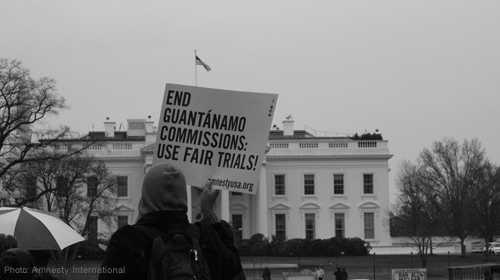
The military commission attorneys and judge for the continuation of the 9/11 pretrial hearings – along with the ACLU's Chandra Bhatnagar, who is monitoring the proceedings.
In addition to the ongoing legal challenges and controversy resulting from unfair procedures, attention to the case has shown a spotlight on the insufficient and inefficient administration of justice at Guantanamo Bay under the military commissions system.
To date, five men have reached a with military commission prosecutors. Two additional men have been convicted after trial, though both of their convictions were overturned (one of those cases is under appeal). So, in the 12 years that the Guantanamo Bay military commissions have been in operation, seven men have been convicted.
According to this past summer, the Guantanamo military commissions have already cost the American taxpayer almost $600 million since only 2007 (the Department of Defense has not released costs of the military commissions for years 2001-2006, before the Military Commissions Act was passed).
Consider that: $600 million spent on seven convictions.
Putting that roughly into perspective, federal prosecutors in US Attorney's offices across the country obtained more than 80,000 convictions per year with of $1.527 billion. That translates to a per-conviction cost for federal prosecutors of just under $19,000 – a drop in the bucket compared to an approximate per-conviction cost at Guantanamo of more than $80 million (what's included in the Guantanamo cost numbers the Pentagon provided to Congress is uncertain because the Pentagon adds in some costs such as ones related to courtroom operations, but also excludes the cost of the Justice Department's role in prosecutions).
All told, the cost per conviction is roughly 4410 times the cost incurred by federal prosecutors at the Department of Justice. For comparison, the difference in cost is about the same as the height difference between a can of soup and the Empire State Building. Simply put, the difference is shocking.
We should be careful to avoid evaluation of judicial systems based only on a calculation of dollars and convictions. But, in the case of the military commissions, it is the misadministration of justice itself that drives costs to such heights.
Due in part to the of the military commission system, counsel and judges in these cases are forced to spend considerable time and resources on . Recent months highlight the problem. Up for contest have been issues such as the in the Guantanamo commissions system. Only in the military commissions does this question need to be litigated.
In spite of this unlawful, unjust, and costly record, the Obama Administration has to prosecute terrorism-related charges at Guantanamo.
But the commission's legal failures and extreme expense beg for a different venue.
Federal criminal courts are by no means perfect, but they are a far better alternative to the military commissions. Federal criminal courts have considerably more experience in trying terrorism cases and have proven more able in protecting the rights of all litigants. The American people, the victims, and the defendants deserve better.
Rather than double down on the unwise investment into the military commissions, it's time we went back to basics.
Learn more about military commissions and other civil liberty issues: Sign up for breaking news alerts, , and .

